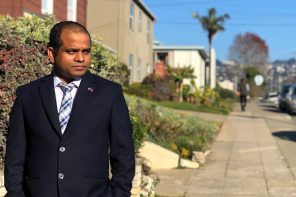In his article in RD last week, Michael Jerryson painted a picture in which Wendy Doniger’s The Hindus— and the fallout from its withdrawal from India—was ushering in a new and “ominous”* era in which religious advocacy groups were trying to exert influence over the academic study of religion. In the piece, Jerryson cited the Hindu American Foundation (HAF) as one of those groups, noting HAF’s Executive Director Suhag Shukla’s critique of an American Academy of Religions (AAR) statement allowing for any interpretation of religion.
Jerryson wrote that “Shukla and the HAF’s stance present several disturbing elements,” citing a supposed mischaracterization of Doniger’s work and Shukla’s take on the academy study of religion, which he called “troublesome.”
Over the past week, Jerryson and I engaged via email. Our correspondences were cordial, but I think it’s safe to say that we agree to disagree, both on his interpretation of HAF’s critique of Doniger and AAR, as well as his own understanding of the politics of academic study of religion.
On the first matter, much has already been said about The Hindus. HAF—as well as a number of Doniger’s academic colleagues, including those who are active in AAR—had substantive issues with her scholarship, including her use of psychoanalysis (long considered a pseudoscience), her misinterpretation of key texts, and an unusually high number of factual inaccuracies (by some independent estimates, up to 500 errors). Doniger had every right to publish her book, and like every academic work, it will have its supporters and detractors. However, by dismissing her intellectual critics outright and not fully explaining the inaccuracies of her book, Doniger did a fundamental disservice to the nature of academic discourse.
Moreover, she helps to uphold a narrative in academia that has pervaded in the study of Hinduism, which I’ll get to shortly.
On the second matter, referred to as “ominous” in the headline, there seems to be a wanton misreading of Shukla’s position. Jerryson argues that the “interpretative dimension is not what is wrong with the study of religion—or of any discipline for that matter. Rather, interpretation is the activity that enables disciplines to develop and to grow.”
I would agree with that. However, when interpretation is based on fundamental misinterpretations, it has the potential to actually prevent the growth of any discipline.
HAF’s objections were not over Doniger’s right to interpret Hinduism, but rather Doniger’s assertion that she has a right to interpret Hinduism any way she wants to and in the absence of vetted discourse. Additionally, Doniger claims to speak for Hinduism when in fact her interpretations diverge from lay historical accounts, lived experiences (including of the Dalits and women she claims to speak for), and years of scholarship.
It would be akin to the American Academy of Sciences giving equal credence to Ken Ham’s theory doubting global warming as it would the decades of research proving the reality of global warming and climate change.
Jerryson broadens his critique of HAF’s stance to assert that the study of religion should not be influenced by religious groups, conflating HAF with Dinanath Batra, the retired schoolteacher who sued Penguin India to “ban” the book in the Indian markets.
“Similar to Mr. Batra,” Jerryson asserts, “Ms. Shukla considers religious organizations the controllers and arbitrators of academic discussion.” He then goes on to offer a dubious claim that he had been censored from offering comments on Shukla’s blog in the Huffington Post, since HAF—or any group or individual that writes for Huffington Post—cannot censor comments. In fact, he did get his comment published. For the record, HAF never called for a ban and vigorously condemned any form of academic censorship. To conflate HAF’s position with Batra is both laughable and offensive, because it lumps together an expanse of criticism—intellectual and irrational—as one.
Shukla’s call for academic integrity in the AAR—which was vetted by a number of scholars active in AAR —is not different from the codes of ethics already in place for most other academic organizations in every discipline. When I was a professor, I had to go through Institutional Review Boards for qualitative studies that involved interpretation of human feeling or practice.
Moreover, Shukla is not making any radical departure from what AAR already does in practice, which is certainly not a case of religious groups arbitrating discussion. For that matter, HAF is not a religious group.
Advocacy groups and what Jerryson calls “political actors”—whether religious or not—have played a significant role in influencing the academy for centuries. AAR’s own scholarship has been shaped by the research of scholars associated with churches, synagogues, and other religious institutions, while religious groups have funded endowed chair positions to (indirectly) advance their views on religion.
Scholars, while independent-minded, become part of that cycle, whether they know it or not. For the hundreds of citations we make in our own paper presentations or journal articles, how many of those citations were influenced/shaped by one special interest or another? And this is true in any field of study (activism, for example, led to the creation of African-American Studies, women’s studies, queer studies, and other ethnic studies), which is why Shukla’s innocuous call for more engagement with Hindus in the study of Hinduism is hardly as ominous as Jerryson claims.
The Legacy of Orientalism
I’ll conclude with why HAF’s criticisms of Doniger’s scholarship resonates in both academic and non-academic circles.
Unlike the study of other religions, the study of Hinduism has for years been largely dominated by Orientalist frameworks originating from the colonial period. Even some of the early interpretations of Hindu texts were published by missionaries, often to highlight the so-called savagery of Hindus. For years, Hinduism was defined by an “outsider” perspective, and in turn, the depictions of Hinduism in other realms—either in media or in educational materials such as textbooks—has been framed in accordance to such perspectives.
As Jakob de Roover writes, this has had a significant impact on not only Hinduism, but how Hindus view themselves. More problematically, scholars—even those whose views were sympathetic towards Hinduism—were reluctant to engage with practicing Hindus, a departure from the study of other faiths. The religious study of Christianity, Judaism, Islam, and more recently, Buddhism, in the academy has been buttressed by strong theological perspectives. Hinduism, at least in the West, still lacks that presence, and until it does, there will always be questions of how the narrative is framed.
Additionally, the academic study of Hinduism in India was (and still is) dominated for years by Marxist scholars, who based their study on a historical materialist perspective that seeks to cast Hinduism as an oppressive social institution. It’s ironic that Jerryson notes the praise of Doniger’s book from Pankaj Mishra, one of those who does come from a Marxist approach to Hinduism.
As an academic Marxist myself, I see the limitations to applying such a framework to the study of any religion, especially when interpretations of philosophy and interpretations of practice (or supposed religious sanction of certain social practices) should be kept separate. To be sure, no one in his/her right mind begrudges Doniger or any of her cohorts for having their views. But their focus on deconstruction begs the questions: when can we actually “construct” a comprehensive understanding of Hinduism? In the short term, the lack of a critical mass of scholars with constructive approaches to Hinduism and an absence of a robust Hindu theological studies in the West prevents us from truly growing the discourse.
This clarification of HAF’s position seeks to further the debate in a constructive manner, not stifle it in the way Jerryson implies.
* Note: the word “ominous” showed up in RD’s headline, not in Jerryson’s piece itself. –The Eds.



